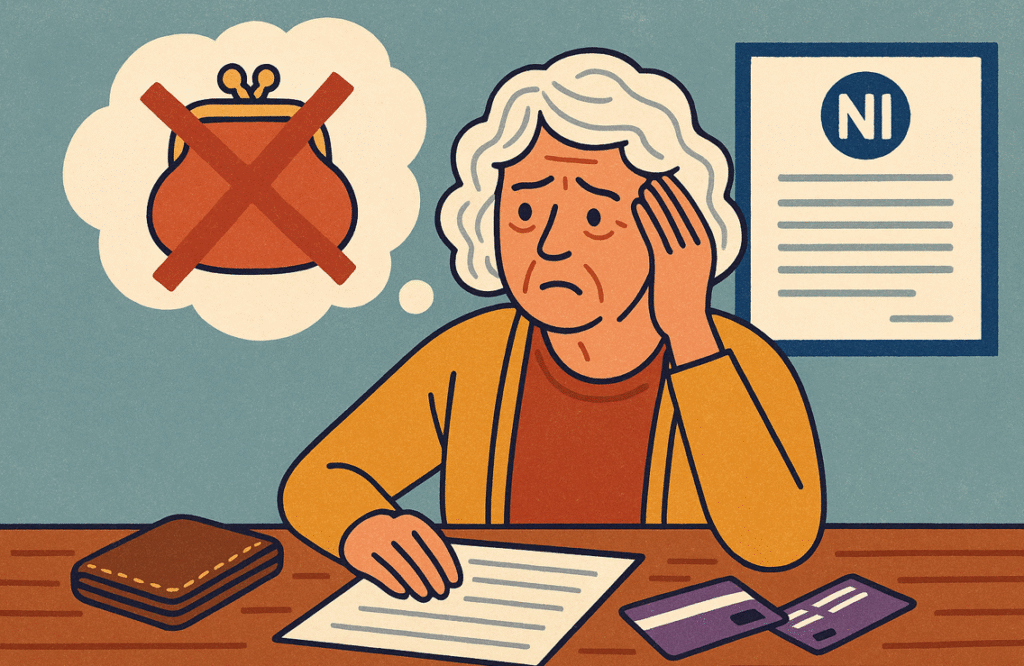What if you’ve never paid National Insurance? The UK State Pension is financed by National Insurance (NI) payments. If you’ve never paid NI, you may worry: Will I get a State Pension in the UK? This article answers:
- Can a woman who has never worked get a State Pension?
- What is the lowest State Pension you can receive?
- What happens if you haven’t paid enough National Insurance?
- Can you claim benefits without NI contributions?
You’ll learn how NI credits, voluntary payments, and overseas contributions might help—even if you never worked.
What is National Insurance and how does it affect your State Pension?
What is National Insurance?
National Insurance is a system of contributions made by workers and employers to fund the UK’s social security system. It offers monetary assistance in the form of advantages like:
-
Maternity Allowance
-
Bereavement benefits
-
Employment and Support Allowance (ESA)
Everyone aged 16 or over who earns above a certain threshold must pay NI, unless exempt.
How Does NI Affect My State Pension?
In order to get the whole State Pension, you often need:
-
35 years of NI contributions or credits
- 10 years or more before receiving a pension
If you don’t have enough years, your weekly pension will be lower.
Types of National Insurance
Class 1 – Paid by employees (comes out of your wages)
Class 2 – Paid by self-employed people (a small weekly amount)
Class 4 – Also for self-employed people (paid as a % of your profits)
Class 3 – Voluntary contributions to address any gaps in your National Insurance record
How many years’ NI do you need for a State Pension?
| Pension Type | Full Pension Requires | Minimum Years for Any Pension |
|---|---|---|
| New State Pension | 35 years | 10 years |
| Basic State Pension | 30 years | None (but less gives less) |
You’ll receive nothing under the New State Pension if you have under 10 qualifying years.
Can a woman who has never worked get a State Pension?
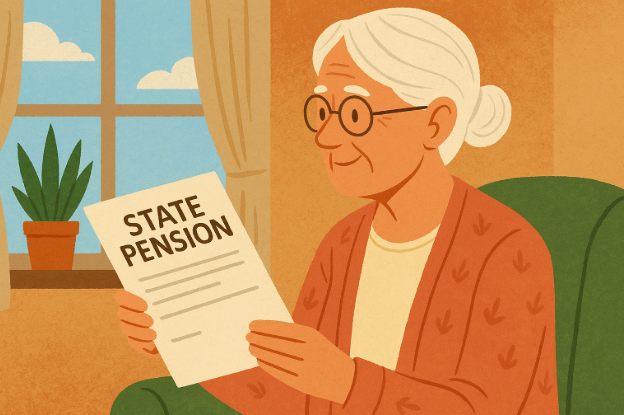
Many people assume that you must have worked your entire life to receive a State Pension in the UK—but that’s not always the case. Even if a woman has never worked, she may still be eligible depending on her National Insurance (NI) record, credits, or her spouse’s contributions (under the old rules).
Does no working history mean no pension?
Does no working history mean no pension? If a woman has never worked, never paid NI, and never received credits, she likely won’t qualify for the New State Pension. This is because:
- At least ten years’ worth of credits or donations are required.
-
Fewer than 10 years = £0 per week
So, unless she has some record—via work or credits—she won’t receive any pension under the new rules introduced in 2016.
What about National Insurance credits?
NI credits support those who don’t pay but still qualify, like:
- Received child benefits for a kid younger than 12
- Was eligible for Carer’s Credit and a registered carer.
- Claimed Jobseeker’s Allowance or Employment and Support Allowance (ESA)
-
Was receiving Universal Credit in certain cases
These credits count as qualifying years, helping build pension entitlements.
Can a non-working spouse increase their State Pension?
When the individual attained State Pension age will determine this.
🔹 Under the Basic State Pension (before April 2016):
-
A non-working wife could claim a spouse-based pension if her husband had a full NI record
-
She could receive up to 60% of his Basic Pension (known as a Category B pension)
-
If widowed, she might inherit even more of his pension
🔹 Under the New State Pension (from April 2016):
-
These spouse-based pensions were abolished
-
Everyone is assessed individually based on their own NI record
-
However, some transitional protections exist (e.g. for women in marriage who paid a lower “married woman’s stamp”)
What is the lowest State Pension you can get in the UK?
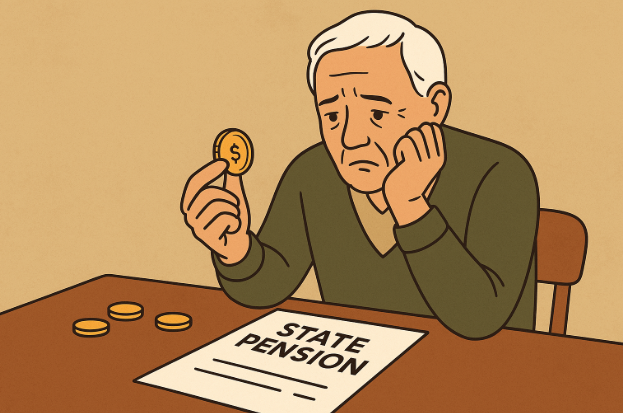
It’s possible to receive a partial pension, or even nothing at all, depending on your NI record.
Can you receive £0 per week?
Yes. Under the New State Pension, you must have at least 10 qualifying years to receive anything.
-
Fewer than 10 years = £0 per week
-
You may be able to buy Class 3 voluntary contributions to fill gaps
In contrast, under the old Basic State Pension, even one year could give you a small amount of weekly pension—because it was based on 30 years rather than an all-or-nothing system.
What’s the lowest non-zero pension?
For the New State Pension (post-2016):
- If you have 10 qualifying years: You get 10/35 of the full weekly amount
For Example: 10 ÷ 35 × £203.85 = £58.24 per week
-
With 30 years: You get 30/35 × £203.85 = £174.57/week
The more qualifying years you have (up to 35), the higher your weekly pension.
For the Basic State Pension (pre-2016):
-
-
Full amount in 2025/26: £169.50/week
-
With fewer than 30 years, it’s paid proportionally
-
Example: 15 years would give you half, or about £84.75/week
UK State Pension Eligibility Based on National Insurance Contributions
| NI Years (Qualifying) | Eligibility | Estimated Weekly Pension (2024–25) | Can You Top Up? |
| 0–9 years | No pension | £0.00 | Yes, via Class 3 payments |
| 10 years | Minimum pension | ~£58.24 | Yes |
| 20 years | Partial pension | ~£116.48 | Yes |
| 30 years (Old Basic rule) | Full Basic State Pension | ~£169.50 | No longer applicable (pre-2016) |
| 35+ years (New rule) | Full New State Pension | ~£203.85 | Not needed |
What happens if you haven’t paid enough National Insurance?
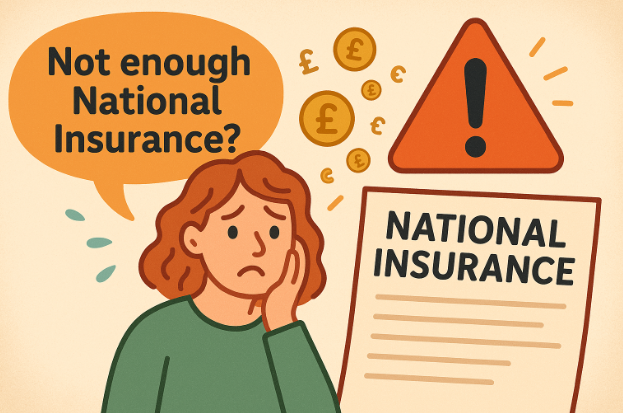
If you haven’t paid enough National Insurance over your working life, your State Pension may be reduced—or you might not get one at all.
Do you get a reduced or no pension?
Yes. Under the New State Pension, you need:
- To receive anything at all, you must have at least ten qualifying years.
-
35 years to get the full amount
If you have between 10 and 34 years, you’ll get a proportionate amount.
For example:
-
20 years ÷ 35 × £203.85 = £116.20/week
So, even if you haven’t paid enough for the full pension, you can still get something.
Can I fund gaps with voluntary contributions?
Indeed! To repair any gaps in your record, you can make voluntary Class 3 National Insurance contributions.
-
Cost for 2024–25: around £18.85 per week
-
One full year: £980.20
It can be worth paying if it boosts your weekly pension permanently.
What happens if gaps are over six years old?
Normally, you can only go back 6 tax years to fill missing years.
However, the government sometimes opens special time-limited windows (e.g. transitional offers for people close to retirement). Always check current rules on gov.uk.
Can I claim benefits if I haven’t paid National Insurance?
Yes—Some perks don’t even need National Insurance contributions.
Are means-tested benefits linked to NI?
No. Benefits like:
-
Universal Credit
-
Housing Benefit
…are determined by your savings and income rather than your NI record.
So, even if you’ve never paid NI, you may still qualify for these forms of help.
Do any benefits need Credits instead of paid NI?
Yes. Some contribution-based benefits accept NI credits instead of actual payments. These include:
-
New Style ESA (Employment and Support Allowance)
-
New Style JSA (Jobseeker’s Allowance)
As long as you’ve built up enough credits, you might qualify.
How do I check and improve my National Insurance record?
Finding any gaps in your NI history is simple.
How to view your NI record
- Visit GOV.UK National Insurance statement.
- Sign in via Government Gateway.
- View paid, credited, and missing years.
Can you pay voluntary NI contributions?
- Gaps from the previous six tax years can be made up.
- A single missing year costs £18.85/week (2024–25 rate).
- Payment deadlines: before reaching State Pension age.
If you’ve never paid NI in the UK but lived abroad, what then?
Living abroad doesn’t mean you’re left out—international agreements may help.
How do overseas contributions affect pension?
The UK and the following nations have pension agreements:
-
EU
-
USA
-
Canada
-
Australia
These agreements help combine your working years abroad to meet minimum requirements, although they don’t add to the pension amount.
How does that affect your forecast?
When you check your forecast on GOV.UK, you’ll only see your UK-based NI years.
But if you later apply for the State Pension, HMRC may adjust your amount based on overseas years—especially for meeting the 10-year minimum.
What NI support is there for carers and parents who’ve never worked?
You could already have NI credits if you looked after a family member or a kid under the age of twelve. This comprises:
- Carer’s Credit for caring ≥20 hours/week
- Child Benefit credits until the child turns 12
These credits can give you qualifying years without formal work.
Can I defer my State Pension to increase the amount?
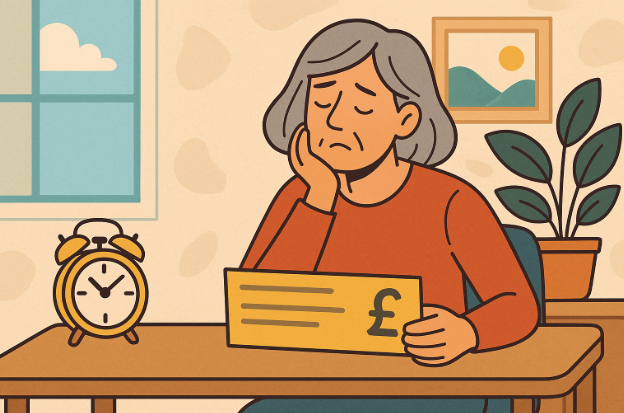
Yes. If you don’t need the money right away, deferring can increase your pension permanently.
-
For each 9 weeks you delay, your pension goes up by 1%
-
That’s about 5.8% increase per full year
This is helpful if you’re still working or have other income and want a higher pension later. There’s no lump sum under the New State Pension, only higher weekly payments.
National Insurance matters for retirement security
NI contributions build:
- A foundation for stable retirement income
- Protection during illness, unemployment, caregiving
- Flexibility, allowing you to buy missing years via voluntary contributions
Consistent NI ensures you maximise retirement income and reduces reliance on means-tested support later in life.
Conclusion – Can you get a State Pension without paying National Insurance?
- A woman who has never worked typically won’t receive a State Pension—unless she has NI credits (for caring or parenting) or her missing years are topped up.
- You can get a pension of £0 per week (New Pension if <10 years).
- With 10–34 qualifying years, you receive a pro-rata reduced pension.
- Voluntary Class 3 contributions help fill gaps.
- Means-tested benefits don’t require NI paid contributions.
- Overseas NI may count through international agreements.
FAQs
1. Can a woman who has never worked get a State Pension?
Only if she’s received NI credits (e.g. Carer’s Credit, Child Benefit) or buys voluntary contributions. Otherwise, she won’t qualify.
2. What is the lowest State Pension you can get in the UK?
£0/week for those with fewer than 10 qualifying years. Otherwise, you receive a pro rata amount based on years.
3. What happens if you haven’t paid enough NI?
You get a reduced pension. You may fill gaps via Class 3 payments—costing £18.85/week for 2024–25.
4. Can I claim benefits without paying NI?
Yes. Means-tested benefits like Universal Credit don’t require NI. Credits support access to contributory benefits like ESA or JSA.
5. Can NI paid abroad count towards my UK pension?
Yes—many countries have reciprocal arrangements. Each country calculates your entitlement separately.
6. Is there a limit when you can top up missing years?
Normally, you can top up only the last six tax years, unless a special window is open.
7. What is NI credit and how do they help someone who never worked?
NI credits equate to qualifying years and apply to carers, parents, and the unemployed. They count toward the State Pension.
8. How reliable is the GOV.UK pension forecast tool?
It forecasts UK-only years accurately. But it doesn’t include overseas or voluntary contributions and assumes static future policies.

I’m Adam Milne, a business writer and co-author at UKBusinessMag.co.uk. I’m passionate about simplifying complex topics—whether it’s tax, startup strategy, or digital marketing—so that entrepreneurs can take action with confidence. With years of experience in small business consultancy, I bring a practical perspective to every piece I write, helping readers turn ideas into results.

